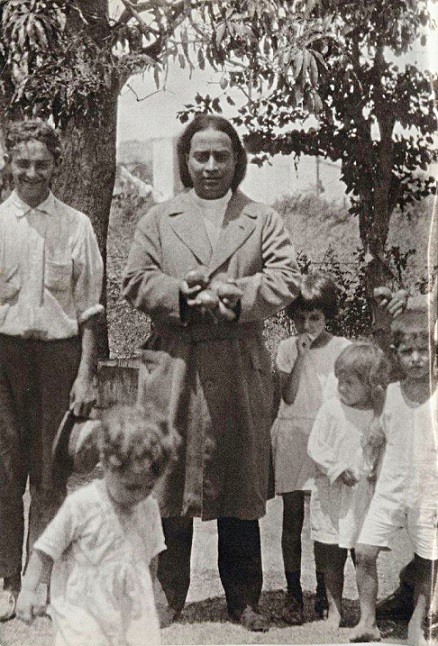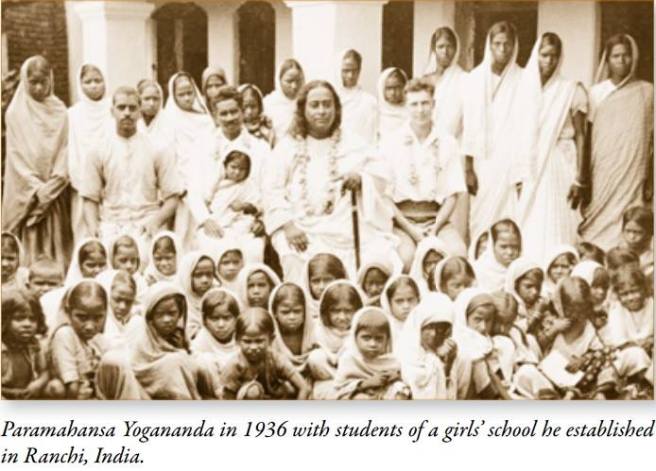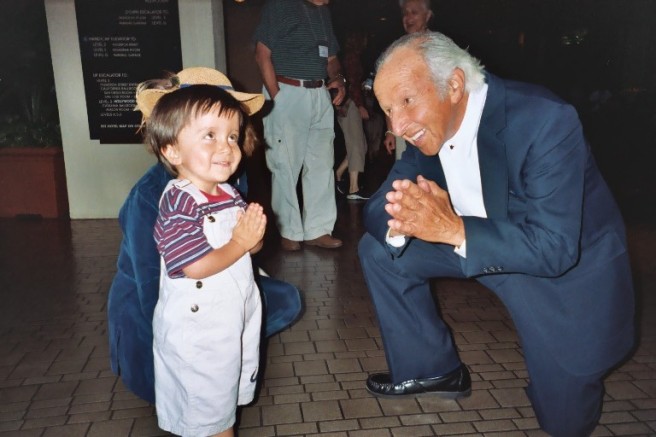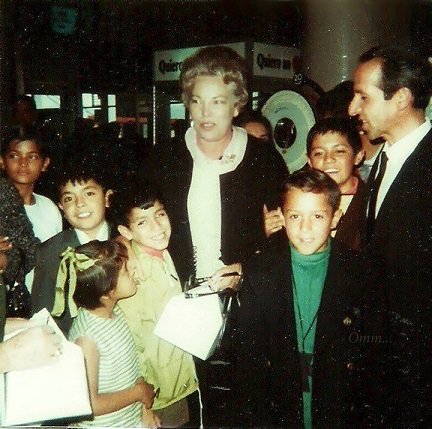
from Brother Anandamoy – “Spiritualizing Family Life,” devotee notes
Brother Anandamoy made reference to a footnote in the Chapter “Sasi and the Three Sapphires” in Autobiography of a Yogi:
Sri Yukteswar, like many another sage, grieved at the materialistic trend of modern education. Few schools expound the spiritual laws for happiness or teach that wisdom consists in guiding one’s life in the “fear of God,” that is, in awe of one’s Maker.
Young people, who today hear in high schools and colleges that man is merely a “higher animal,” often become atheists. They do not attempt any soul exploration or consider themselves, in their essential nature, to be “images of God.” … An educational system that does not present Spirit as the central Fact of man’s existence is offering avidya, false knowledge. ….
The education of youth in ancient India was ideal. At the age of nine, the pupil was received “as a son” in a gurukula (guru’s family home as a seat of learning). “The modern boy spends [annually] an eighth of his time at school; the Indian spent his whole time there,” Professor S. V. Venkateswara writes in Indian Culture Through the Ages (Vol. I; Longmans, Green & Co.). “There was a healthy feeling of solidarity and responsibility, and ample opportunity for the exercise of self-reliance and individuality. There was a high standard of culture, self-imposed discipline, and stern regard for duty, selfless action, and sacrifice, combined with self-respect and reverence for others; a high standard of academic dignity, and a sense of… the nobility and the great purpose of human life.”

~~***~~
Dharma is selfless action and sacrifice combined with self-respect. Discipline can be governed by a tyrant or a loving guide. The tyrant is out. The loving guide is in. Children do not have to earn the love of their parents. That love is there unconditionally. They don’t have to earn it.
Parents want super children. We say, no, SRF parents want outstanding spiritual training for their children. We are putting too much pressure on children. They begin to think, “I need to excel or else I won’t be loved.’ Some want the child to succeed and indirectly make the parent look good. But this is putting too much pressure on the children. Or parents may want to think, “My child is better than your child.” We have to discipline them, but they have to feel that they are loved.
Putting children down, telling them they are lazy, stupid, or clumsy is more damaging to them than physical abuse. If a person has a low self-image, he cannot love himself. Make it a rule. Every day tell your child something he did well. It means that you believe in him and he is learning to believe in himself. If the child receives only praise and love, he will be spoiled and self-centered. If he receives only discipline, he will rebel and act out. The right formula is to give correction and love. If this is consistently done, the child will see you as a friend not an enemy.
Try to understand how your child is feeling. If they are upset or expressing fear, don’t deny their feelings by saying that there is no need to be upset or afraid. ‘You are just tired.’ When their feelings are pushed aside, the child thinks there is something wrong with him. He learns not to trust his own feelings and emotions. Don’t teach a child not to trust his own feelings but to rely solely on yours. Put yourself in the child’s shoes. The biggest problem is that many people do not put themselves in the place of the other to understand how they are feeling.
When a child is expressing anger, you can’t just ignore it. They can’t just turn off their emotions like a light switch. It is wrong to hurt others or damage things while in a rage. One child came home boiling with rage. His mother took a paper and crayons and told him, “Show me how angry you are. Wow! You are really angry, aren’t you?” Then she asked him to make a picture of himself when he was happy. This was in a couple of minutes. The anger dissipated in a very short time.
The same thing is true with fear. A little boy was very afraid of a bad thunderstorm. It was very loud. His mother told him, “Go to your room. God is in your room. You go upstairs.” Just as he opened the door to his room, there was a tremendous crescendo of thunder. He ran back down the stairs and said, “Mother I’m coming down now. You go up there and be with God!”
In another instance of a thunderstorm, the mother and father were with the children, and it was very clear that the thunderstorm was very close. There was a huge clap of lightning and the lights went out. The lights came back on. The father said, “That was pretty scary, wasn’t it.” The kids were so relieved. Their thinking was that they were always afraid, but the adults were never afraid.
It is important that we teach children responsibility. Daya Ma talks about this in Only Love. *** When a mother is cooking and cleaning all day, and the kids have no responsibility, that is not right. Kids should each be taught to share in the household responsibilities. The principle of responsibility and self-respect is that a rightful contributing member of the family does his share. This helps the child to feel useful and productive. This leads to a sense of capability and a positive self-image.

Brother relayed a story of being in Italy, standing across the street watching a little girl meticulously hanging the laundry on the clothesline of a second floor balcony. She saw him watching, looked at him, and then went back to carefully hanging the clothes up. When she finished, she looked at him, held her head up proudly, and went back inside. Brother noted that it had been 20 years since this happened, but he still had a vivid memory of this little girl and how proud she was of her work.
Brother advised parents, “Please don’t expect perfection.” He said that parents should discourage continued dependence, but should encourage self-reliance, self-imposed discipline, and self-respect. Let them learn from their little mistakes and failures. This is a part of self-confidence and self-reliance. Kids need to be led to self-governance. They have a cruel world out there and a lot of peer pressure. If a child has a low self-image, he gives in to peer pressure because he wants to be accepted. If a child has a high self-image, he will learn to dare to be different.
Brother relayed a story where he was at a large banquet and ordered a vegetable plate. A waiter called out loudly, with disdain, “And who ordered the vegetable plate.” Brother raised his hand without shame. After the affair was over, people came up to him to talk about this. He noted that he could see awe in their faces because he dared to be different without apology.
Brother said that his own mother told him, when he returned to Switzerland as a monk, “Tell me what did I do wrong.” He asked her, “What do you mean?” She told him, “I must have made some terrible mistakes for you to turn out like this.” He confided that she wanted lots of grandchildren.
By learning the principles of developing spiritual relationships, we can make it easier for ourselves and our children.
Brother then held up the album cover for the newly released recording by Master, Beholding the One in All – (See all recordings of Paramahansa Yogananda). He explained that the audio on the original tape was very bad with many background noises, making it hard to understand Master’s words. He said proudly that SRF monks had developed a technology, not yet available in the world, for removing the background noises so that Master’s voice could clearly be heard. He also said that it was so important to have the recordings of our guru’s talks, even though there are only a few of them, so that we can hear not only what Master said, but how he said it.
from Brother Anandamoy – “Spiritualizing Family Life,” devotee notes

***Included in Daya Mata’s book ONLY LOVE in Chapter 6 is some wonderful counsel on parenting children, in the section ‘Who Is Responsible for Teenage Behavior?’
~~~~~~~
BACK TO
BRO. ANANDAMOY TALKS and STORIES complete list
YOGANANDA’S DIRECT DISCIPLES

